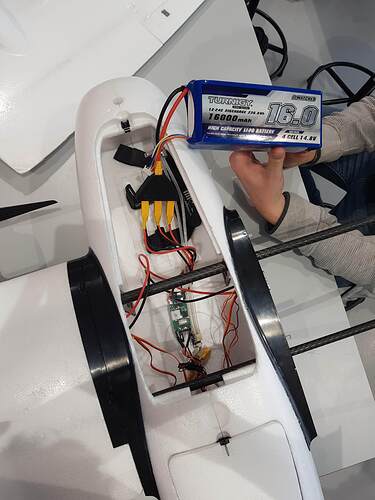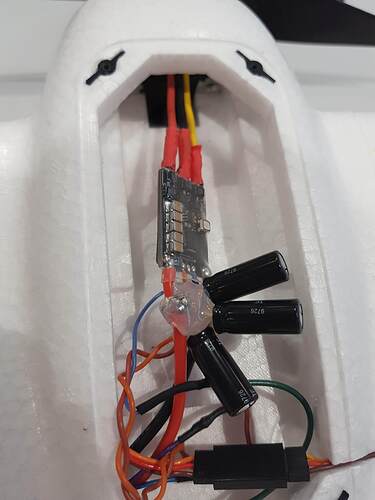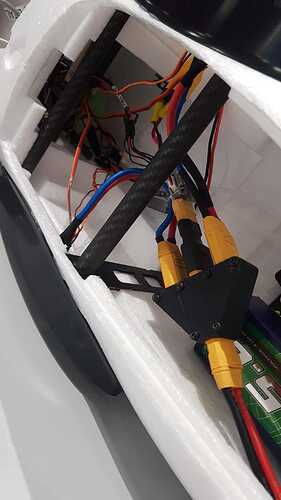Hello,
I have a setup with a fixed-wing dual motor drone which I want to power using a single Lipo battery. When I throttle up, however, above around 60% the motors start stuttering and don’t spin smoothly anymore. A video of the problem can be found here.
The setup I am using consists of:
- Believer twin motor airframe
- 2x PROPDRIVE v2 3536 910KV Brushless Outrunner Motor link
- 2x Turnigy MultiStar BLheli_32 ARM 41A Race Spec ESC 2~5S (OPTO) link
- Turnigy High Capacity 16000mAh 4S 12C Lipo Pack w/XT90 link
- Carbon Fiber Propeller 12x6 Black (CW / CCW) (2 stuks) link
- Pixhawk PX4
It is wired up as follows:
Battery → Parallel three-way splitter (1,2,3) → (1) ESC left wing, (2) ESC right wing, (3) Power to pixhawk rail & other internal components.
A picture of the wiring can be seen here:
I have tried numerous configurations, and measured the current through the wires using a current clamp. The configurations are listed here:
Configuration 1 → Problem occurs at 60%:
- One battery powering everything
- Both motors attached
- Both propellers attached
Configuration 2 → Problem does not occur:
- One battery powering everything
- Both motors attached
- No propellers attached
Configuration 3 → Problem does not occur:
- One battery powering everything
- Only one motor attached
- Propeller attached
Configuration 4 → Problem does not occur:
- Three batteries powering everything separately (one for each ESC + one for the Pixhawk)
- Both motors attached
- Both propellers attached
Configuration 5 → Problem occurs at 60%:
- Two batteries in parallel powering everything through the three-way parallel splitter
- Both motors attached
- Both propellers attached
While you could say that using separate batteries for each ESC (Like in Configuration 4) is a solution to this problem, it is undesirable for our application since it will weigh more, and take up more space. Configuration 4 will also introduce a possible problem when the batteries are not charged to the same voltage.
Experiment data:
Measurement 1: Use Configuration 1, measure current drawn from battery:
- throttle 50% → 11.8A
- engine cutoff at throttle 62% → 20.5A
- while stuttering at 62% fluctuation between 10A and 15A
- throttle 100% → fluctuation between 14A and 18A
Measurement 2: Use Configuration 1, measure current going to left wing ESC:
- throttle 50% → 6.26A
- engine cutoff at throttle 62% → 9.8A
- while stuttering at 62% fluctuation between 3A and 8A
Measurement 3: Use Configuration 3, measure current drawn from battery:
- throttle 50% → 6.2A
- throttle 62% → 11.1A
- throttle 100% → 35A
Measurement 1 and 2 seem to convey the same data, where if the current going to only one of the two ESCs is measured is about half of the current that is being drawn from the battery in the same configuration.
I am truly at a loss what could be the cause of this problem. I have debunked the following hypotheses:
- Battery cannot supply enough current. Not true because firstly, the battery should theoretically be able to supply much more current. Secondly, attaching two batteries in parallel still yields the problem at the same throttle value (See configuration 5). Thirdly, it is measured that the battery can supply at least 35A (See measurement 3). The problem occurs around 20A, so this should not be the problem.
- Interference to the signal wire. Don’t think this is true because the problem does not occur when only one ESC is attached. If would be weird if this configuration does not result in interference, but configuration 1 does…
I would love to hear from you what you think the problem might be!



